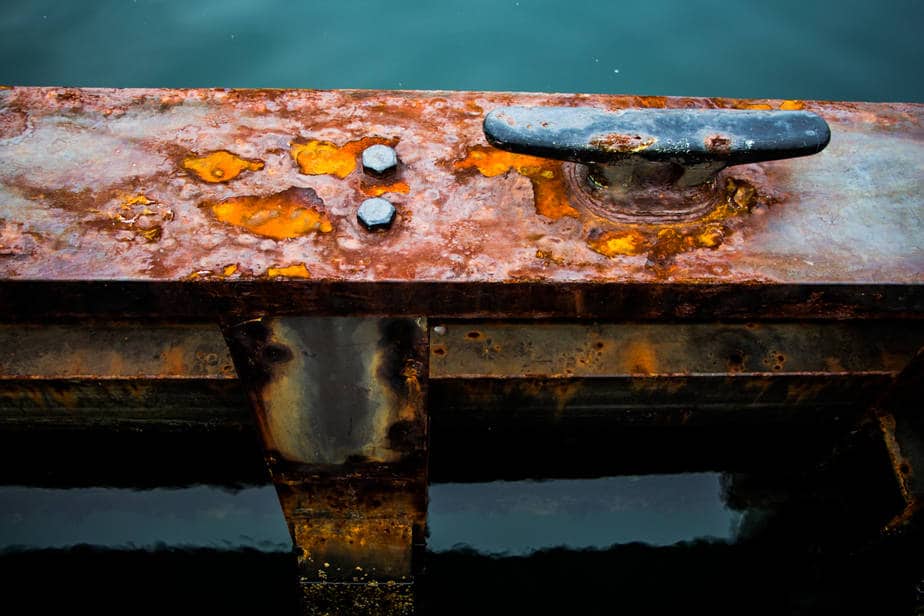Does Salt Water Damage Aluminum Boats?
The sea has always had a way of calling for us, and we listen – making our way out to her in any way we can. But, to keep these adventures happening, we need to take care of our watercraft. For aluminum boats, saltwater can be dangerous.

Table of Contents
- Does Salt Water Damage Aluminum Boats?
- What Exactly Causes Aluminum Corrosion in Saltwater?
- Prevention of Corrosion in Your Aluminum Boat
- Why Powder Coating?
- Preparing your Scapegoat
- Additional Tips and Tricks
- How Long Can Aluminum Last in Saltwater Without Protection?
- What Metal is Best for Saltwater?
- Get Out There
Does Salt Water Damage Aluminum Boats?
Does saltwater damage aluminum boats? Yes, salt water corrosion does damage aluminum boats. Over time, aluminum slowly oxidates in saltwater. The electrochemical inside the aluminum of the boat isn’t strong enough to handle the harsh effects of corrosion caused by the saltwater.
Aluminum does a great job of resisting corrosion most of the time. Unfortunately, saltwater, unlike freshwater, is very harsh with its corrosion, and it’s up to you to protect it. Not just from saltwater, but from barnacles and different types of issues that only arise in salt water.
Here are some different options to prevent corrosion along your, rivets, bolts, and other hardware on your aluminum hull boat. These will help you stand the test of time and tide.
What Exactly Causes Aluminum Corrosion in Saltwater?
Your aluminum fishing boats are not rusting. It is suffering from the harsh effects of corrosion due to exposure to saltwater. Aluminum Handrail Direct defines rust as “the oxidation of iron or steel as a result of interaction with water or air.” This is unrelated to our situation because aluminum does not contain the presence of other metals like iron or steel.
Aluminum’s natural state is in mineral form. The metal form of aluminum that we’re all familiar with is created when the mineral bauxite is crushed, processed, and smelted. When that new metal aluminum is exposed to an unnatural environment, it causes the metal to oxidize.
Oxidation is when a metal slowly returns to its original mineral state. This chain reaction is called corrosion, or the “wearing away of metal as a result of chemical action.” So, saltwater causes your aluminum boat so slowly break apart through corrosion.
The rate of corrosion on a particular metal is determined by how chemically active than metal becomes once in saltwater (unlike in fresh water). When not in contact with any other metals, most marine metals will corrode at a relatively slow rate.
But right when you add different minerals, the aluminum will begin to fall apart more quickly. Another example could be when you notice your hull becoming pitted due to a bronze through-hull on a nearby boat.
To keep saltwater boats made of aluminum lasting, you need to become aware of different metals coming on or around your boat.

Prevention of Corrosion in Your Aluminum Boat
The most straightforward solution when attempting to prevent further corrosion in your aluminum boat would be to look for powder-coated aluminum.
This is a dry powder, containing pigments, curatives, polymer resin, flow modifiers, leveling agents, and tones of other additives that will help preserve the youth of your aluminum boat.
Powder-coating is applied by boatbuilders to the surface of an aluminum boat by using electrostatic spray deposition. Then, a curing oven will help transform the powder into the smooth, hard polymeric coating.
Overall, this treatment adds a durable finish, reduces maintenance issues, and helps to calm the harsh effects that salt water has on aluminum (unlike fiberglass boats).
Powder coating is a finish. Similar to a traditional protective paint coating, builders can decorate it with colors and textures in a wide array of styles.
So, you can have a boat bottom of whatever fun color you desire. You can also do multiple coats to mess around with the texture as well before you head out for some saltwater fishing.
This resistance barrier provides both a fun design and a protective layer. Powder coating shields the material underneath from destructive forces, like the harsh galvanic corrosion from saltwater. It’s different, however, from traditional paint.
Why Powder Coating?
Powder coating is truly the best way to protect your aluminum boat from saltwater damage. Here are some reasons why:
- Choice: The pigment in the powder helps produce an astounding array of colors. And while the finished product is smooth, it’s possible to achieve a wide range of textures too.
- Eco-Friendliness: The application method of this product produces far less overspray than traditional painting techniques. Helping ensure as much paint sprayed lands on the boat canvas. Additionally, the powder used for powder coating doesn’t contain nearly as many of the harsh chemicals also found in traditional paints. Which then chip off in the water affecting the environment greatly over time.
- Durability: Powder Coating is sure to stand up against all the harsh effects of saltwater corrosion, even along the waterline. And yet, the differences in hardness, thickness, and flexibility may be invisible to the naked eye compared to those found from traditional paint. And needless to say, it does generate tremendous durable protection for the core material of the boat, helping to prevent cracks and moisture from entering your boat’s joints and crevices while you’re angling in saltwater.
With powder coating, you’re sure to experience the highest durability and the least amount of maintenance.
Preparing your Scapegoat
Another solution would be to direct all the chemical activity elsewhere, to your scapegoat, or a sacrificial anode. This would be a piece of Zinc metal that you attach to the bottom of your craft. Zinc is the best metal to use with aluminum because it’s much weaker compared to the rest of the boat.
This little piece of metal is taking the brunt of the saltwater damage to protect the rest of the boat. The zinc, being more chemically active than aluminum, gives up its electrons instead.
As long as the anode is electrically connected to the bottom of your craft, by direct contact or by wire. This will stuff the aluminum with excess electrons, so it loses those rather than the aluminum giving up its own.
The zinc will erode, sacrificing itself for the benefit of your boat! Just be prepared to be constantly upgrading your sacrificial zinc anode to keep your boat protected.
Pro tip: Place nylon washers to keep the heads of the zinc from touching the aluminum with help protect your boat even more from possible damage.
Additional Tips and Tricks
When attempting to take the precautions necessary for keeping your craft intact, first, make sure whatever you’re working with is made to work with aluminum.
This would include any paints, grease, lubricants, or anything else you use to protect your boat. Understand the delicateness of owning an aluminum boat compared to one made of fiberglass.
Keeping that in mind, be cautious of new damages and staying on top of the care of old ones. Whenever you notice you have bottom paint chipping off or scratching, you’re putting your boat at serious risk.
If you’re aware of scratches or chips on your boat and you know you’ll be around saltwater, put it on a lift when you’re not using it.
In addition, try to hose it down thoroughly to get rid of any additional salt left hanging around that could start to erode. Be sure to dry it off after as well. You need to replace any paint or dry powder as you go.
If you keep your boat at a marina and you have available shore power, hook it up to an isolation transformer when it’s left at the dock.
Other personal watercraft and vessels can contribute to the chemically charged environment. Significantly helping prolong the life of your anodes and preventing corrosion.
How Long Can Aluminum Last in Saltwater Without Protection?
Typically an aluminum boat will last anywhere from 2 to 3 weeks without proper protection. You can expect to start seeing fouling within a week or two, and beyond that, you will most likely come across from damage.
What Metal is Best for Saltwater?
Stainless steel is recognized as a premium material when it comes to marine applications, where you can expect to find excellent corrosion resistance, luster, strength, and stiffness.
Get Out There
Aluminum vessels are known to offer tons of advantages to boat owners.
Although, it’s necessary to understand the benefits are pointless if there are no extra precautions made to protect your boat from the effects of the elements.
Take care of your boat, for it takes us to beautiful places. Happy sailing!
